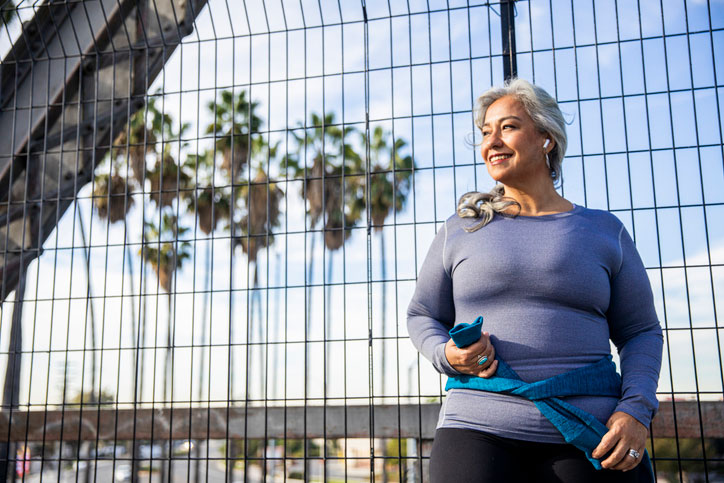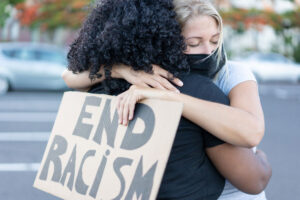Written by Scott Wilson

Something you know about Escambia County even before you start studying social work here is that people take care of their own. You can see the evidence in the county-based Community and Resource Centers scattered from Oak Grove to Perdido Key. You can find it in the work being done through the Safe Neighborhood Program. You will hear about it from families served by the afterschool program and summer camp programs that the Escambia County Neighborhood and Human Services department runs.
Pensacola is also where the Florida Department of Children and Families Circuit 1 is located, hosting a range of public programs that Western Florida families depend on.
But despite all these efforts, the job of social workers in Escambia County is far from done. It’s a corner of the old South where systemic racism still raises its ugly head. It has a population that is on average younger than the rest of the state, but more of them are living below the poverty line with substandard healthcare.
According to J.U.S.T Pensacola, a local assembly of 17 Escambia County churches, in 2023 there were 1,000 fewer rental homes and apartments than needed to house residents—and seventy percent of workers in the county didn’t bring in enough to afford those units if they did exist.
Leroy Boyd Set the Standard for Escambia Social Justice Advocates
 You don’t talk about social justice in Escambia County without talking about Leroy Boyd.
You don’t talk about social justice in Escambia County without talking about Leroy Boyd.
Most social workers educated in the Pensacola area today are familiar with Movement for Change. A grassroots organization that was founded in 1997 to address disparities in areas as wide-ranging as education, law enforcement, and voting rights, it’s behind voter registration drives, fighting open displays of the Confederate flag, and investigating suspicious deaths in the Escambia County jail. And it was founded by Leroy Boyd in 1997.
Coming up in an era where Black men in the South were expected to avert their gaze when addressing the authorities or prominent local white citizens, Leroy stood tall and looked them in the eye. He offered respect and listened carefully, but he expected the same in return—and eventually, he got it.
Boyd was the biggest reason that Alcaniz Street is now Martin Luther King, Jr. Drive north of Cervantes. But he was after more than symbolic changes in Escambia, and he got many of those, too—teacher pay raises, voter transportation efforts, Back to School readiness programs, and school dress codes to elevate and promote equality for the disenfranchised.
Leroy Boyd passed away in 2010 but his impact on Pensacola and Escambia County lives on through social workers pursuing the same goals here today.
Earning a Social Work Degree in Escambia Offers an Education That Works Anywhere in Florida
Social work schools here are a vital resource for any number of local medical centers, charities, and government agencies responsible for maintaining the health and well-being of West Florida residents.
In turn, many of these organizations have a strong hand in educating future social workers who are pursuing degrees here. The Refuge for Women, West Florida Hospital, and West Florida Hospital all have longstanding relationships with local universities to serve as signs for capstone field instruction experiences.
Naturally, that also means that plenty of graduates from Escambia social work degree programs end up with careers rooted in local organizations and agencies:
- Lakeview Center
- Families First Network
- Florida Department of Children and Families
- Children’s Home Society
It’s a kind of community-centric education that you’ll have a tough time finding in more urbanized and fast paced Florida counties.
CSWE-Accredited Master of Social Work (MSW) & Bachelor of Social Work (BSW) Degrees in Pensacola & Online
With anything less than a Bachelor of Social Work (BSW) degree, you aren’t even allowed to officially describe yourself as a social worker in the state. But for many Escambia County social work students, it’s going to eventually lead to a Master of Social Work (MSW) from a CSWE-accredited school.
That’s because the two state-issued credentials for social workers in Florida, the LCSW (Licensed Clinical Social Worker) and CMSW (Certified Master Social Worker) require that level of education. With a CSWE stamp on the lid, an MSW with specific coursework in either clinical studies or administrative and policy work will get you over the largest single hurdle to state licensure.
Going in that direction takes you to a single school that delivers exactly that kind of education:
University of West Florida
Department of Social Work
Pensacola, FL

Other locations include Fort Walton Beach
- MSW (online, on-campus)
- BSW
UWF delivers both MSW and BSW degrees accredited by the Council on Social Work Education (CSWE). The Department of Social work takes pride in what social work graduates contribute back to the community. That starts long before graduation, with field placements and volunteer opportunities that build up local institutions and individuals. For example, UWF students and staff collaborate with FAMU on the 2nd Alarm Project, offering behavioral health support to firefighters throughout the Florida Panhandle.
The MSW program is available online and on campus, with full and part-time options. You may also be accepted as an advanced standing student if you already hold a CSWE-accredited BSW; naturally, a BSW from UWF is an easy transition to make. The MSW offers all required coursework to qualify for Florida state LCSW licensure. BSW students can choose among minors in aging studies, child welfare, social welfare, and substance abuse.
